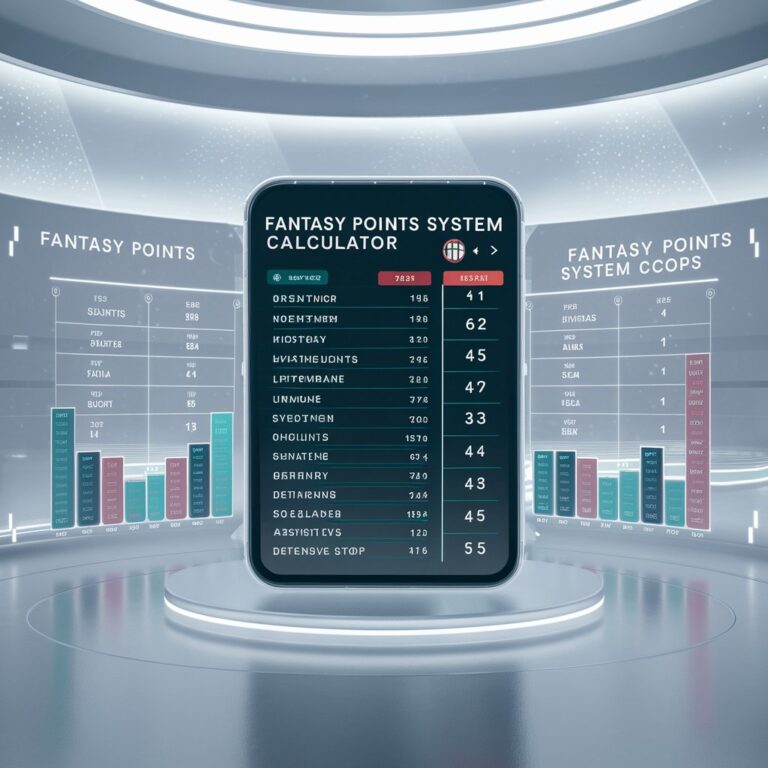How are fantasy points calculated?
Are you tired of losing in fantasy sports because you don’t know how to calculate fantasy points?
Fear not, dear reader! With this guide, you’ll be able to accurately calculate fantasy points and dominate your league in no time.
So sit back, relax, and let’s dive into the wonderful world of fantasy points calculation.
Basic Formula for Fantasy Points Calculation:
Let’s start with the basics. In most sports, the formula for calculating fantasy points is pretty straightforward.
You simply add up the points earned by each player based on their performance in the game. For example, in football, a player may earn 6 points for a touchdown, 1 point for every 10 rushing or receiving yards, and 1 point for every reception.
By adding up all of a player’s points, you get their total fantasy points for that game.
Here’s an example. Let’s say your starting quarterback throws for 250 yards, 2 touchdowns, and 1 interception in a game.
Using the basic formula for fantasy points in football, their total fantasy points for that game would be:
250 passing yards = 10 fantasy points (1 point for every 25 passing yards) 2 touchdowns = 12 fantasy points (6 points for each touchdown) 1 interception = -2 fantasy points
Total fantasy points = 20
Adjusting Scoring for Different Leagues and Formats:
But what if you’re playing in a league with different scoring rules or formats?
Don’t worry, we’ve got you covered. Here are a few examples of how to adjust scoring for different leagues or formats:
- In PPR (points per reception) leagues, you would add an additional point for each reception made by a player.
- In some leagues, you may earn bonus points for long plays or for reaching certain yardage milestones (e.g. 100 rushing yards, 200 passing yards).
- In daily fantasy sports, the scoring system may be more complex and may vary depending on the specific site or platform being used.
By understanding the unique scoring rules and formats of your league, you can adjust your fantasy points calculations accordingly and gain a competitive advantage over your opponents.
Advanced Fantasy Points Calculations:
Ready to take your fantasy points calculation skills to the next level?
Let’s explore some advanced methods for calculating fantasy points in more complex sports.
In basketball, for example, you may earn points for different statistical categories such as points scored, rebounds, assists, steals, and blocks.
Each category may have a different point value assigned to it, and some leagues may even award negative points for missed shots or turnovers.
In baseball, fantasy points are typically calculated based on a player’s performance in different statistical categories such as hits, home runs, RBIs, and stolen bases.
Check out our Fantasy Basketball Points Calculator:
However, some leagues may also take into account a player’s defensive performance, such as their fielding percentage or number of assists.
By mastering these more complex methods for calculating fantasy points, you can gain a deeper understanding of the game and potentially gain an edge over your opponents.
Common Mistakes in Fantasy Points Calculation:
As with any type of calculation, there are some common mistakes that people often make when calculating fantasy points. Here are a few to watch out for:
- Forgetting to include certain scoring categories or bonuses in your calculation.
- Failing to deduct points for penalties or negative plays (such as interceptions or missed shots).
- Relying too heavily on automated scoring systems without double-checking the results.
To avoid these mistakes, it’s important to carefully review the scoring rules and formats of your league and to double-check your calculations before submitting your final lineup.
Tools for Fantasy Points Calculation:
There are many tools available to help you calculate fantasy points more easily and accurately. Some popular options include:
- Fantasy sports apps or websites: Many fantasy sports platforms provide built-in tools for calculating fantasy points based on your league’s specific scoring rules and formats. These can be a convenient and reliable way to ensure you’re calculating points correctly.
- Excel spreadsheets: For more advanced users, creating your own Excel spreadsheet to calculate fantasy points can provide even greater flexibility and customization options. There are also many pre-made templates available online that you can use as a starting point.
- Online calculators: If you’re looking for a quick and easy way to calculate fantasy points without needing to set up a full spreadsheet or app, there are many online calculators available that can help. These typically allow you to enter player stats manually and then automatically calculate the total fantasy points earned.
Check out our Fantasy Points Calculator:
Conclusion
Calculating fantasy points can seem daunting at first, but with a little practice and understanding of the rules and formats of your league, it can become second nature.
By mastering these skills, you’ll be able to make more informed roster decisions and potentially gain a competitive advantage over your opponents.
So go forth, calculate those fantasy points, and dominate your league like a boss!





